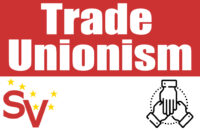This article will update readers on a couple of interesting and important developments for unionised workers in both the South and the North of Ireland.
Two position papers have been published in the last couple of months on union recognition, collective bargaining, and the right to organise, and one piece of important legislation has been brought forward in the Northern Ireland Assembly.
As readers will know, the Government in the South has instituted a high-level working group to review collective bargaining (including the ICTU) which will specifically look at the question of union recognition as well as wage-setting mechanisms. While we are not holding our breath, it does represent a further development and occurs in a context of mounting pressure and momentum elsewhere on these issues.
In the United States small unions are being formed in universities, coffee shops, breweries, the media, and warehouses. The Biden regime has put forward the Protecting the Right to Organize Act (now held up in Congress).
New Zealand has amended legislation that already grants unions a right of access, requiring employers to provide new employees with a copy of the relevant collective agreement and details of union contacts and how to join their union alongside their individual contract of employment, and providing paid time for union reps to do their duties in work. And the government has introduced a new Fair Pay Agreement, which strengthens sectoral pay bargaining, to come into force in 2022.
The EU directive pushes on with the Minimum Wages and Collective Bargaining Directive, though it is not without its problems.
These are just some of the policy moves that capital is making around the world to address imbalances and inequalities that threaten periodic crises of over-production and over-accumulation within the system. Such policies are the “better” form of managed capitalism.
In Ireland, repeated legal actions by employers (clearly demonstrating the class nature of the legal system and judiciary) have undermined industrial relations law and institutions and have left many people in the trade union movement looking to the EU and the potential EU Directive on Minimum Wages and Collective Bargaining as the solution.
This largely comes from frustration within the movement. However, where workers struggle, ideas and hope will always exist, and another way forward is being suggested. Daryl D’Art, a lecturer in employee relations at DCU, has argued that the prevailing conservative legal view is wrong and that the constitutional argument is really a bogeyman used to discourage legislators, and indeed the trade union movement, from trying to act. In this regard it has been very successful.
D’Art argues instead that if one takes a “purposive” approach to the interpretation of the right to join a union enshrined in the Constitution of Ireland that right is meaningless without a concomitant right to collectively bargain. This is a position supported in recent times by a number of rulings by the European Court of Human Rights.
The Financial Services Union has issued a pamphlet, Unionising and Collective Bargaining,* which calls for the right to join a union. It states:
All workers in Ireland have the constitutional right to join a trade union, but this is often frustrated, discouraged, or even penalised by some employers. It is time to change this and make it easier and safer for all workers to join a trade union. The greatest obstacles to joining a union from workers is fear of employer hostility and not being encouraged to join.
The document argues for legislation to
provide trade unions (staff and elected officers) with the right to access all workplaces to educate workers on their basic entitlements, including joining the trade union and discussions on workplace issues and collective bargaining. Union Representatives must also be provided statutory facilities time and support, including digital means, to carry out union duties including the recruitment of new members into the union.
These facilities should extend to workplaces where unions are not recognised. Union Representatives must be allowed discuss all workplaces matters including pay and conditions and must be provide meetings rooms and email access to arrange both physical and digital workplace meetings. These meetings can be held on paid working time. Union Representatives must be provided induction time with all new employees.
The pamphlet argues for legislation so that
workers who so wish can have trade union subscriptions deducted by their employer with the relevant details and the correct subscription passed to the designated trade union. Any employer refusing to give the right subscription should be liable to pay any arrears to the trade union and be in breach of the law and so fined. The threat or practice of removal of at source deduction needs to be removed from the bargaining table and legally protected.
On victimisation and unfair dismissal, the FSU document calls for
strong anti-victimisation measures . . . including immediate reinstatement, pending case, and significant financial penalties if proven. Union Representatives must have the strongest protections to be able to carry out their role free from fear of employer retaliation and employers must be disincentivised from doing so.
The FSU also did some polling, in which 1,292 people took part. They were asked: “Currently employers are not legally obliged to negotiate with the trade unions of their employees. Should employers be legally required to negotiate with their trade unions if employees wish them to do so?” 74 per sent of respondents said Yes, 17 per cent No, and 10 per cent replied Don’t know.
There were two other important features. Between age groups the answers remained remarkably consistent, showing no less interest in collective bargaining among younger people than among older generations. And, based on voting intentions by political party, a majority of voters of all parties in the Dáil support the legal right of unions to negotiate if employees wish them to. The weakest support was (no surprise) among Fine Gael voters, at 56 per cent Yes, and the strongest among Labour Party voters, at 95 per cent. This suggests significant support for a legislative approach to rebalance power in the work-place more towards organised workers.
In line with this kind of thinking, Gerry Carroll MLA (PBP) has brought forward a Trade Union Freedom Bill, which seeks to do a number of positive things to undermine Thatcherite legislation from Britain, namely:
- repealing the ban on secondary picketing,
- providing for electronic voting in ballots,
- reducing the period of notice of the start of a ballot given to employers from seven days to two days,
- reducing the employment size required for collective bargaining from over 21 to 5, and
- expanding the definition of collective bargaining to include “terms and conditions of employment” more broadly.
These are all initiatives that communists and all readers of Socialist Voice should support. While not an end in themselves for the working class, they will, if secured, redefine the balance of power in work-places for organised workers and organised labour.
*Available at https://www.fsunion.org/assets/files/pdf/fsu_unionising__collective_bargaining_final_version.pdf






